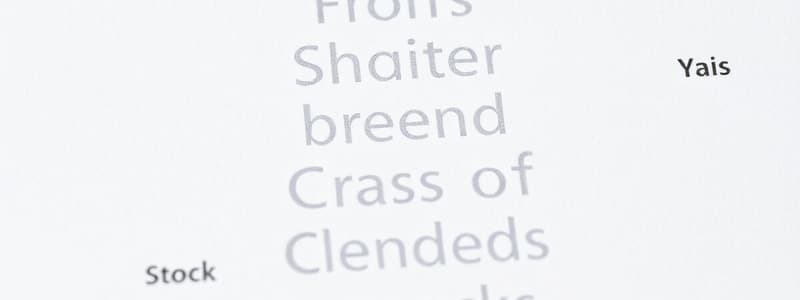Podcast
Questions and Answers
Which type of noun refers to general names like 'city' or 'dog'?
Which type of noun refers to general names like 'city' or 'dog'?
- Common Nouns (correct)
- Abstract Nouns
- Proper Nouns
- Concrete Nouns
An adjective describes or modifies verbs only.
An adjective describes or modifies verbs only.
False (B)
What are words that take the place of nouns called?
What are words that take the place of nouns called?
pronouns
The word 'quickly' is an example of an adverb that describes __________.
The word 'quickly' is an example of an adverb that describes __________.
Match the following types of verbs with their definitions:
Match the following types of verbs with their definitions:
Which of the following is a possessive pronoun?
Which of the following is a possessive pronoun?
Conjunctions only connect sentences, not words or phrases.
Conjunctions only connect sentences, not words or phrases.
A __________ is a word that shows the relationship between a noun and other words in a sentence.
A __________ is a word that shows the relationship between a noun and other words in a sentence.
Flashcards are hidden until you start studying
Study Notes
Parts of Speech Overview
- The eight parts of speech are the building blocks of sentences and indicate the role of words in a sentence.
1. Noun
- Definition: A person, place, thing, or idea.
- Types:
- Common Nouns: General names (e.g., city, dog).
- Proper Nouns: Specific names (e.g., London, Fido).
- Abstract Nouns: Ideas or concepts (e.g., love, freedom).
- Concrete Nouns: Physical objects (e.g., apple, chair).
2. Pronoun
- Definition: A word that takes the place of a noun.
- Types:
- Personal Pronouns: Refer to specific persons or things (e.g., I, you, he, she).
- Possessive Pronouns: Indicate ownership (e.g., mine, yours, theirs).
- Demonstrative Pronouns: Point to specific items (e.g., this, that).
- Interrogative Pronouns: Used to ask questions (e.g., who, what).
3. Adjective
- Definition: A word that describes or modifies a noun or pronoun.
- Types:
- Descriptive Adjectives: Describe qualities (e.g., blue, tall).
- Quantitative Adjectives: Indicate quantity (e.g., some, many).
- Demonstrative Adjectives: Point out specific nouns (e.g., this, those).
- Possessive Adjectives: Show ownership (e.g., my, your).
4. Verb
- Definition: A word that expresses action or a state of being.
- Types:
- Action Verbs: Show physical or mental activity (e.g., run, think).
- Linking Verbs: Connect the subject to a subject complement (e.g., is, are).
- Auxiliary Verbs: Help the main verb express tense or mood (e.g., have, will).
5. Adverb
- Definition: A word that modifies a verb, adjective, or other adverb.
- Types:
- Manner: How something is done (e.g., quickly).
- Time: When something happens (e.g., now, yesterday).
- Place: Where something happens (e.g., here, there).
- Frequency: How often something occurs (e.g., always, never).
6. Preposition
- Definition: A word that shows the relationship between a noun (or pronoun) and other words in a sentence.
- Examples: in, on, at, between, under.
7. Conjunction
- Definition: A word that connects words, phrases, or clauses.
- Types:
- Coordinating Conjunctions: Connect similar elements (e.g., and, but, or).
- Subordinating Conjunctions: Connect a dependent clause to an independent clause (e.g., because, although).
- Correlative Conjunctions: Pairs of conjunctions (e.g., either...or, neither...nor).
8. Interjection
- Definition: A word or phrase that expresses strong emotion or surprise.
- Examples: oh, wow, ouch, hurray.
Parts of Speech Overview
- Eight parts of speech function as foundational elements of sentences, indicating the role of words.
Noun
- Represents a person, place, thing, or idea.
- Common Nouns: General names like "city" or "dog."
- Proper Nouns: Specific names such as "London" or "Fido."
- Abstract Nouns: Concepts like "love" or "freedom."
- Concrete Nouns: Tangible objects like "apple" or "chair."
Pronoun
- Substitutes for nouns to avoid repetition.
- Personal Pronouns: Refer to specific entities (e.g., "I," "you," "he," "she").
- Possessive Pronouns: Indicate ownership (e.g., "mine," "yours," "theirs").
- Demonstrative Pronouns: Point to specific items (e.g., "this," "that").
- Interrogative Pronouns: Used for asking questions (e.g., "who," "what").
Adjective
- Modifies or describes nouns or pronouns.
- Descriptive Adjectives: Detail qualities (e.g., "blue," "tall").
- Quantitative Adjectives: Indicate amounts (e.g., "some," "many").
- Demonstrative Adjectives: Specify which nouns (e.g., "this," "those").
- Possessive Adjectives: Show ownership (e.g., "my," "your").
Verb
- Expresses actions or states of being.
- Action Verbs: Indicate physical or mental activities (e.g., "run," "think").
- Linking Verbs: Connect subject to complement (e.g., "is," "are").
- Auxiliary Verbs: Help convey tense or mood (e.g., "have," "will").
Adverb
- Modifies verbs, adjectives, or other adverbs.
- Manner: Describes how actions are performed (e.g., "quickly").
- Time: Refers to when actions occur (e.g., "now," "yesterday").
- Place: Indicates location (e.g., "here," "there").
- Frequency: Describes how often actions happen (e.g., "always," "never").
Preposition
- Shows relationships between nouns (or pronouns) and other sentence elements.
- Examples include "in," "on," "at," "between," and "under."
Conjunction
- Connects words, phrases, or clauses.
- Coordinating Conjunctions: Join similar elements (e.g., "and," "but," "or").
- Subordinating Conjunctions: Link dependent clauses to independent ones (e.g., "because," "although").
- Correlative Conjunctions: Work in pairs (e.g., "either...or," "neither...nor").
Interjection
- Conveys strong emotions or surprise.
- Examples include expressions like "oh," "wow," "ouch," and "hurray."
Studying That Suits You
Use AI to generate personalized quizzes and flashcards to suit your learning preferences.



